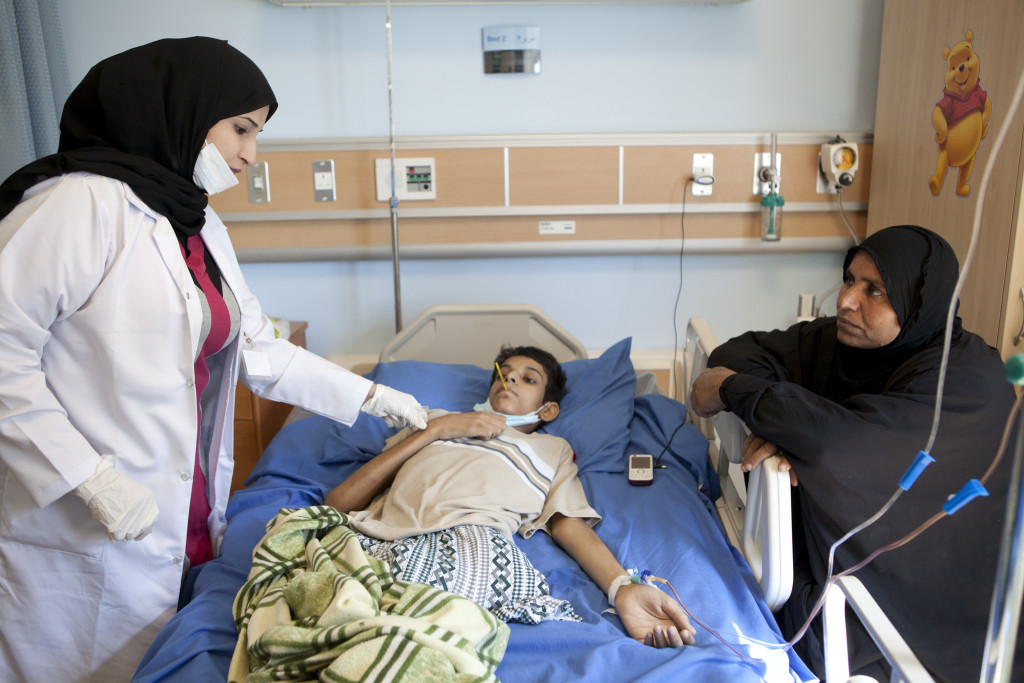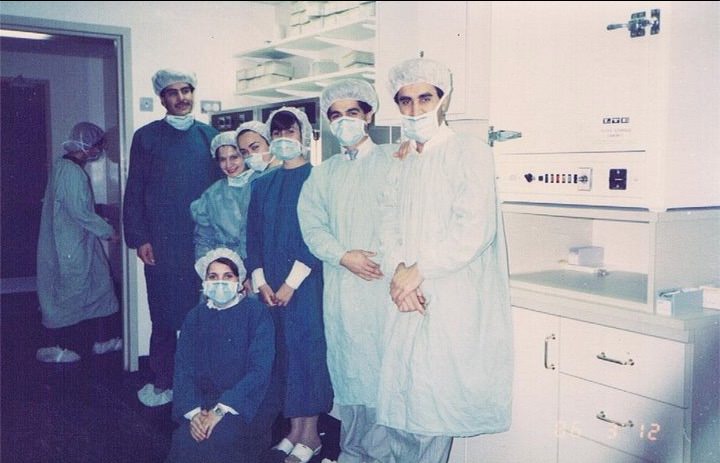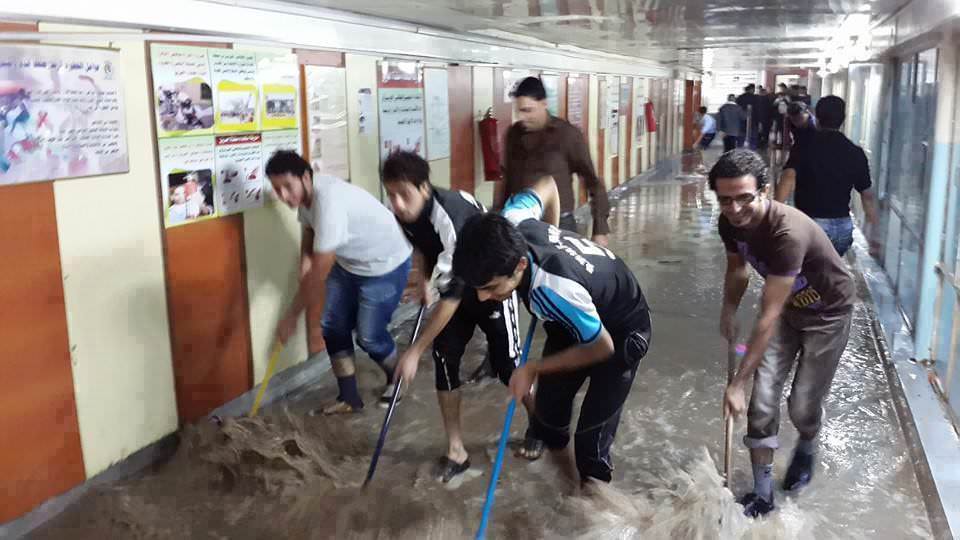
Doctors in Iraq: Vilified, Hunted and Killed
Nazli Tarzi
Nearly a month since the incident, Yazan is still awaiting news on whether he will be transferred to a different hospital where he can safely pursue his career in medicine. He didn’t appear worried as we exchanged words through a videophone call, but rather bemused rather by his own predicament: a junior doctor who could be hunted down, gunned and killed, simply for doing his job.
*
*
*
*
*
*
*
*
*

Decades of war and sanctions have left Iraqi patients with a destroyed healthcare system.
The problem of violence against doctors
“Humiliated, beaten, insulted, and threatened — for what? — for things so trivial that they defy logic; demands for supplements, injections, or drugs that patients are not in need of,” Yazan exclaimed. Patients, as he explained, seek to impress their authority on doctors, and if that fails, they flaunt their phones threatening to end their life with a single call to powerful militias. This reversal of roles has played out for several years now, sustained by an underworld of militia gangs and tribal networks that are armed and well connected and lamentably respected, in the absence of a functioning state.
Death threats, grievous harm, aggression and kidnappings depict a daily reality lived by medical staff in today’s Iraq. Thirteen blood-drenched years have rolled by since America’s occupation, following almost a decade of sanctions. Yet healthcare inside Iraq remains incapacitated, and physicians are bearing the brunt of a toxic situation defined by rising respiratory illnesses, contaminated water, dwindling drug supplies, eroding equipment, and a general lawlessness. The crisis remains difficult to quell, exacerbating the issue of violence against doctors.

Once Iraq boasted a robust and modern healthcare system. The College of Medicine, University of Baghdad, Class of 1987.
“In today’s Iraq, it isn’t the doctor that’s calling the shots,” Yazan joked, “it’s the patient who determines their treatment or condition, using violence if he doesn’t get his way.” The many tales Yazan quietly narrated from his Baghdad home suggested a complete breakdown in the relationship between doctors and patients, reflecting a wanton disregard for the important role doctors occupy in any society.
The culture of killing ushered in by the war in 2003 infected all aspects of life until the present moment. After American-led coalition forces destroyed the country’s water and electricity supplies, Iraq has still not recovered from the wholesale decimation of its medical services. Decades of war and occupation sealed the fate of the country’s primary health care system, having morphed into an anarchic jungle with marauding gun-wielding militiamen and sectarian actors whose sense of justice is void of moral responsibility.
“We can’t work miracles, we don’t have supernatural powers, nor are we here to be ordered as servants by patients and hypochondriacs,” Yazan defended wryly. “The worst instances are when corpses are brought in, accompanied by a chorus of relatives screaming: ‘Doctor, help, he’s not breathing, or his temperature is cold, or, he’s not moving.’ We cannot announce their death on arrival, out of fear of being attacked, so we put on a performance for the families so they can witness with their own eyes us trying to resuscitate and use everything else within our means to save the patient, even though they’re already dead,” added Yazen.
Operating on a financial shoestring, hospital staff are left picking up the pieces of their country’s faltering hospitals and clinics. They are vilified, scapegoated and abused by displeased patients and their families. A little less than a decade ago the Iraqi cabinet passed a bill purposely intended to remedy the problem by offering physicians legal protection. But, like all other political initiatives in the country, this has failed. Medical working environments are becoming increasingly dangerous as more bullet-riddled bodies are discovered. With nowhere to turn or to lodge complaints, a sense of despair is settling among physicians, many of whom fear any one of them could be next to die at the hands of angry mobs.

One of Baghdad’s largest hospitals flooded after heavy rainfall this year.
“They [the Americans] and those who violently climbed their way up to the top of the Iraqi state were more interested in securing a slice of the cake to care about the safety and wellbeing of medical staff,” said another doctor who spoke on the condition of anonymity.
After decades of dictatorship, war and sanctions, the situation in Iraq is untenable. Even the adviser to Iraq’s ministry of defence, Abbas Al-Abadi accused militia gangs of fuelling the problem by imposing their will on the capital: “they fill the streets of Baghdad, spreading instability and carrying out assassinations.”
Armed militias are extensions of political parties and come with different allegiances, most of which are sectarian and some even tied to forces operating outside Iraq. Their growing power has disfigured the political landscape, both challenging and trumping the federal legal system. The state’s inability to curb their power has inadvertently given credence to the false claims and demands voiced by tribes against physicians.
Revenge is sought by some. Others are hungry to amass fortunes by capitalising on death, demanding ‘blood money’, otherwise known as fassel. It is a form of compensation extracted from physicians irrespective of what resulted in the person’s death. The complaints of doctors against escalating violence are heard but unheeded by the state, whose frailties have paved the ground for the re-consolidation of tribal self-governance — placing the welfare of doctors at grave risk.
Dr. Karim Salman Al-Gharboui, consultant in general medicine, Dr. Waseem Khatheer Abbas, orthodontist, Dr. Hassan Ashour Hussein Al-Shuwayli, hematologist, Dr. Mohammad Hazem and Dr. Jaffar Hussein, consultant anaesthetists, are the latest victims to have fallen in this surge of violence in the last three months. The real death toll is believed to be much higher, as the details of some fatalities are not always known or released.
Fearing for their lives, many more doctors choose life in exile. This was the path taken by Iraqi plastic surgeon Dr. Abdul-Fatah Al-Ani in 2005, fleeing his native Iraq after an attempted assassination on his life. Al-Ani, who now resides and practices in Sweden, was stabbed twice by black-clad masked men on the doorstep of his surgery in Baghdad. He was immediately admitted into hospital where he underwent a lobotomy of the stomach.
The saga didn’t end there. After returning home, a heavy brown envelope was slipped beneath the front door of his home. It contained two used Kalashnikov bullets and a death note – die or leave Iraq in the space of 24 hours – was the presented ultimatum. While Al-Ani successfully escaped, some 50 of his colleagues and friends were less fortunate, murdered by criminal gangs during the initial phase of America’s occupation.
There are so many tales related to attacks on medical personnel in Iraq. Hundreds have been killed in the last decade. Despite their abundance, they offer but a small window into a much larger problem. Every day, more and more young doctors leave Iraq to seek a better future. Highly-skilled and self-made doctors like Yazan long to migrate to Europe or America to escape, as those before them have done.
For coming generations, the ongoing exodus of Iraq’s doctors could be the greatest tragedy of all.
Nazli Tarzi is London based freelance British Iraqi writer, videographer and translator. Her works dedicate special focus to developments in Iraq, its lost civilisations and mosaic population. She holds a Masters degree in Middle East Politics from the School of Oriental and African Studies, and works in the field of film production. She dreams to one day fly back to Iraq and peacefully dwell in her motherland. Follow her on Twitter: @nazl
http://shakomako.net/politics/doctors-in-iraq-vilified-hunted-and-killed/
